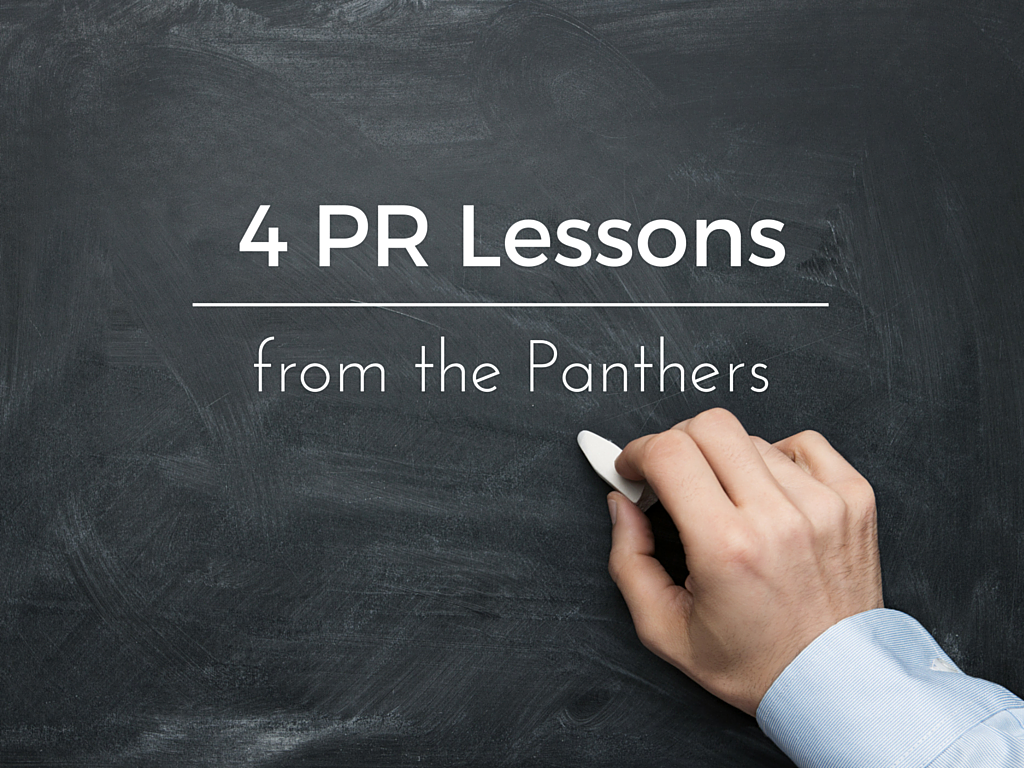
By Daniel Bliley
A dream season ended as the final seconds ticked away for the Carolina Panthers.
Defeated, Cam Newton marched over and greeted Peyton Manning through a flurry of confetti and cameras.
The two quarterbacks shared a handshake and a smile in a perfect display of sportsmanship.
Soon after, recently crowned NFL MVP Cam Newton was under siege.
It wasn’t the field performance. The interception. The fumble. The loss.
It was his seemingly poor attitude.
After a tough game, the star player sat dejected in his seat during the media interviews.
Suddenly, Newton ended his news conference and walked out after a few terse answers with reporters.
As he disappeared from view, the character assault began.
Journalists, former players, and fans lined up to criticize how Newton handled the experience.
The next 24 hours were spent trying to downplay the event and ultimately revealed a few PR lessons on how to handle a firestorm of criticism.
Four PR Lessons from the Panthers Response
- Own it. One day later, Newton finally addressed the media with more than one-word responses. There was no apology, no excuse, and no alternate version of what happened. He readily admitted he was a sore loser. He didn’t backtrack. He doubled down. This strategy can neutralize critics and disarm future attacks. It’s a proven way to escape embarrassment. If everyone is laughing at your bad haircut, make fun of it yourself. Take the power of your hecklers away. Domino’s Pizza executed this in a marketing campaign when it acknowledged its pizza shortcomings. Domino’s owned it, vowed to improve, and saw a subsequent rise in share price.
- Rely on a legend.When speaking to the media, Newton referenced an iconic figure in football lore. Hall of Fame coach Vince Lombardi once said, “You show me a good loser and I’m going to show you a loser.” Newton used this quote to his advantage. It diverted attention and pushed the focus of the audience to someone they knew instead of his walk out. Not everyone may agree with Lombardi’s quote, but it was a brilliant move by Newton. After accepting his behavior and taking away the power of the criticism, he then leaned on the words of a respected figure in sports history. This helped remove the spotlight of the news conference and rallied support from a familiar voice with a similar mindset. The message was clear. It’s not just me. One of the greatest of all time also feels this way.
- Focus on the why, not the what. When Panthers general nanager David Gettleman was asked aboutNewton’s behavior, he used very clear words to support his player, “I look for players who hate to lose.” This brought attention to the circumstances more than the individual action and served as support for his employee. It gave accreditation to the competitive fire we look for in athletes and validated the “why” of the action instead of the “what.” It moved the focus away fromNewton and made it about the team and an organization that wants a winning culture.
- Speak the same language. One of the most important pieces in crisis communication is presenting a unified front. In the wake of Walkoutgate, Newton, coach Ron Rivera, Gettleman, and fellow teammates all spoke the same language. The game is emotional. It’s hard to lose. He hates to lose. We hate to lose. There is more to Cam than this one incident. Let’s move on. When everyone speaks the same language, it defuses the onslaught of questions and gives journalists little opportunity to create rifts in the message. Unity works.
On the scale of one-to-scandal, this is relatively low.
I’m not advocating doubling down on illegal activity or mass public deception.
It’s also good measure to apologize to help handle damage control.
However, the talking points on display from the game aftermath are great weapons to have in your media relation arsenal.
These PR lessons: Own the narrative, rely on relevant legends, focus on the why of the situation, and speak the same language. This will help you deal with your next round of scrutiny.
Or just keep winning and never have to explain a loss.
image credit: shutterstock